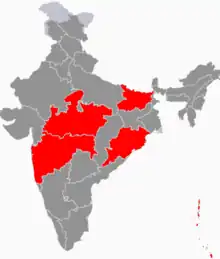Asanada agharkari
Asanada agharkari is a species of small Scolopendrid centipede in the subfamily Scolopendrinae.[1][2]
| Asanada agharkari | |
|---|---|
| Scientific classification | |
| Domain: | Eukaryota |
| Kingdom: | Animalia |
| Phylum: | Arthropoda |
| Subphylum: | Myriapoda |
| Class: | Chilopoda |
| Order: | Scolopendromorpha |
| Family: | Scolopendridae |
| Genus: | Asanada |
| Species: | A. agharkari |
| Binomial name | |
| Asanada agharkari Gravely, 1912 | |
| Subspecies | |
| |
 | |
Appearance
Asanada agharkari is small, measuring between 13 and 32 mm (0.51 and 1.26 in) in length.[1][3] The antennae have 17 articles, though Gravely initially described the species with 17-18.[3] They are dark reddish-purple in colour, but fade to pale brown or grey when preserved in alcohol.[1]
Asanada agharkari singhbhumensis
Asanada agharkari singhbhumensis is found in the Singhbhum district, and is distinguishable from A. a. agharkari only by colour; it is grey with a dark line down the middle of its trunk.[1]
Taxonomy
Asanada agharkari was initially described by Frederic Henry Gravely in 1912 in the seventh volume of the Records of the Indian Museum, a journal based in Calcutta.[1] He gave it the genus name Pseudcryptops (Pocock, 1891), a name which has since been synonymized with Asanada, and also described two subspecies: A. a. agharkari and A. a. singhbhumensis.[4][1][2] The last taxonomic review was done in 1978 by Jangi and Dass, in the same paper that synonymized Pseudocryptops with Asanada.[5][3][6]
The type specimens are alcohol-preserved at the Zoological Survey of India in Calcutta. There is one adult and one juvenile, both are slightly damaged and have suffered decolourization due to long preservation.[3]
Distribution
A. agharkari is endemic to India and is found the Andaman and Nicobar Islands, as well as the states of Bihar, Maharashtra, Odisha (Orissa), and Madhya Pradesh.[7] The type locality (of the lectotype) is Koyna Valley in the Western Ghats, in Satara District in Maharashtra.[5]
References
- Indian Museum.; Museum, Indian; India, Zoological Survey of (1912). Records of the Indian Museum. Vol. 7. Calcutta: Pub. by order of the trustees of the Indian Museum.
- "Asanada agharkari (Gravely, 1912)". www.gbif.org. Retrieved 2022-09-01.
- Jangi, B.S.; Dass, C.M.S. (August 1978). "Identity and redescription of the Indian centipedePseudocryptops agharkariGravely (Chilopoda: Scolopendromorpha: Scolopendridae)". Journal of Natural History. 12 (4): 423–426. doi:10.1080/00222937800770281. ISSN 0022-2933.
- "ITIS - Report: Pseudocryptops". www.itis.gov. Retrieved 2022-09-01.
- ".:CHILOBASE:". chilobase.biologia.unipd.it. Retrieved 2022-09-02.
- Khanna, Vinod (1994). "CENTIPEDE FAUNA OF CORBETT NATIONAL PARK, UTTAR PRADESH, INDIA (CHILOPODA : SCOLOPENDROMORPHA : SCOLOPBNDRIDAE)" (PDF). Records of the Zoological Survey of India. 94: 329–350.
- Khanna, V. (2006). "A checklist of centipedes (Chilopoda: Scolopendromorpha) from central India". Zoos' Print Journal. 21 (2): 2164–2166. doi:10.11609/JOTT.ZPJ.1427.2164-6. S2CID 76547729.